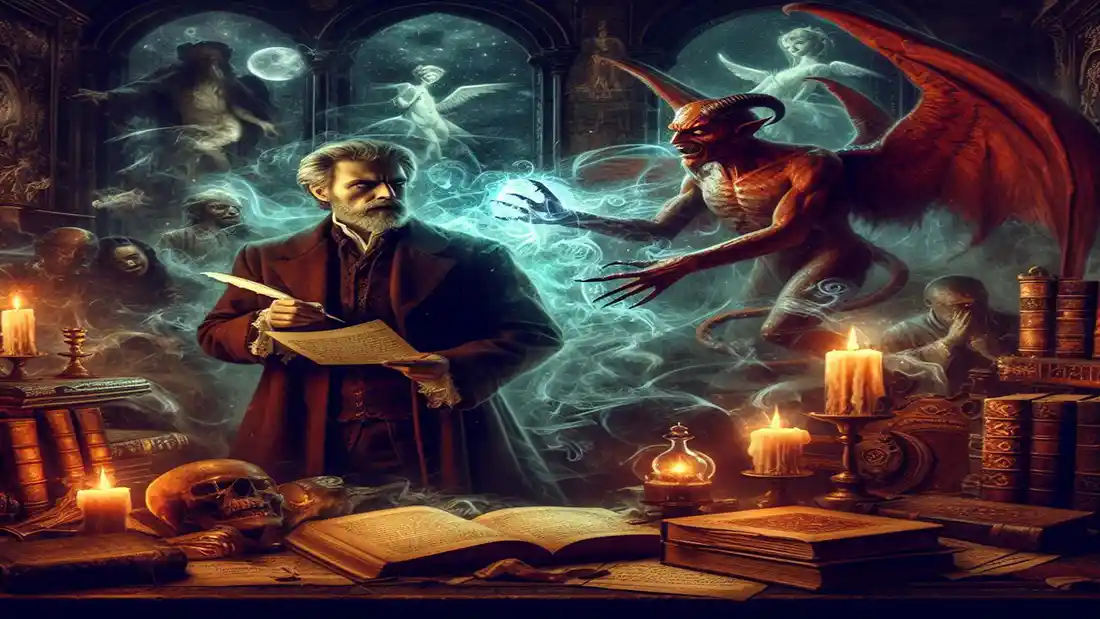Morality plays were a popular form of drama in the medieval period, aiming to teach moral lessons to the audience. These plays often depicted the struggle between good and evil, emphasizing the importance of virtue and the consequences of sin. Characters in morality plays were often symbolic, representing abstract qualities such as virtue, vice, temptation, and salvation.
Read More: Symbolism in Doctor Faustus
Morality Play “Doctor Faustus”

One of the most famous plays in English literature, Doctor Faustus by Christopher Marlowe, is often debated as a morality play. Although it introduces elements of Renaissance drama, it retains significant characteristics of a morality play. The story revolves around Dr. Faustus, a scholar who seeks unlimited knowledge and power by making a pact with the devil. Through his journey, the audience learns about the dangers of unchecked ambition and the consequences of forsaking moral values.
Elements of Morality in Doctor Faustus
A morality play typically includes a protagonist who represents humankind, a battle between good and evil forces, and a final lesson about morality. In Doctor Faustus, Faustus himself represents humanity’s desire for power and knowledge. The Good Angel and the Evil Angel symbolize his internal struggle between righteousness and sin. His ultimate downfall serves as a warning against giving in to temptation and ignoring divine grace.
The character of Mephistophilis, the demon who assists Faustus, plays a crucial role in showing the dangers of turning away from God. Throughout the play, Faustus is given multiple chances to repent, but his pride and desire for worldly pleasures prevent him from seeking redemption. This aligns with the central theme of morality plays, which is to teach the audience about the importance of making ethical choices.
The Conflict Between Good and Evil
In morality plays, there is always a clear distinction between good and evil. In Doctor Faustus, this battle is vividly represented by the Good Angel and the Evil Angel. The Good Angel advises Faustus to repent and seek God’s mercy, while the Evil Angel encourages him to pursue his desires without worrying about his soul. This constant internal conflict is a defining characteristic of a morality play.
The audience sees Faustus struggle with his decision throughout the play. Even after signing the contract with Lucifer, he experiences moments of doubt and regret. However, he fails to act on these feelings and ultimately seals his fate. This struggle reinforces the moral lesson that ignoring good advice and following the path of sin leads to destruction.
The Role of the Seven Deadly Sins
Another key feature of morality plays is the depiction of the seven deadly sins—pride, envy, wrath, sloth, greed, gluttony, and lust. In Doctor Faustus, these sins appear in a theatrical form when Lucifer presents them to entertain Faustus. Each sin is personified and describes its nature, further emphasizing the play’s moral message.
Faustus himself embodies several of these sins, particularly pride and greed. His excessive pride leads him to believe that he can control the devil and gain unlimited power. His greed for knowledge and pleasure blinds him to the reality of his situation. The inclusion of the seven deadly sins serves as a reminder that indulging in such vices leads to spiritual downfall.
The Ending: A Moral Lesson
The conclusion of Doctor Faustus reinforces the idea that it is a morality play. In the final scene, Faustus realizes the gravity of his mistake and desperately seeks salvation. However, his repentance comes too late, and he is dragged to hell by demons. His tragic end serves as a powerful warning to the audience about the consequences of ignoring moral values.
In traditional morality plays, the protagonist is usually given the chance to redeem themselves. While Faustus is given many chances, he repeatedly ignores them, making his fate inevitable. This deviation from the usual structure of a morality play adds depth to the story while still maintaining its moral essence.
Is Doctor Faustus a True Morality Play?
Some critics argue that Doctor Faustus is not a true morality play because it also contains elements of tragedy and Renaissance humanism. Unlike traditional morality plays, where the protagonist is a simple representation of mankind, Faustus is a deeply complex character with ambitions and desires. Additionally, morality plays typically focus on religious themes, whereas Doctor Faustus explores broader Renaissance ideals such as the pursuit of knowledge and individualism.
However, despite these differences, Doctor Faustus still retains the core elements of a morality play. It presents a clear moral lesson, depicting the struggle between good and evil and the consequences of one’s choices. Therefore, Doctor Faustus can be seen as a blend of both morality play and tragedy, making it a unique and powerful work in English literature.
Read More: Atheism in Doctor Faustus
The play Doctor Faustus by Christopher Marlowe is often considered a morality play due to its strong moral messages, symbolic characters, and emphasis on the consequences of sin. Through the character of Faustus, Marlowe warns the audience about the dangers of unchecked ambition and the importance of repentance. The presence of good and evil forces, the use of allegorical figures, and the ultimate moral lesson align Doctor Faustus with traditional morality plays.
While it also incorporates elements of tragedy, the play remains a significant example of how morality plays influenced Renaissance drama. The story of Faustus continues to serve as a timeless lesson on the consequences of making immoral choices. Thus, the idea of a morality play in Doctor Faustus remains an important topic of discussion among scholars and literature enthusiasts.
Through its engaging storyline and deep moral significance, Doctor Faustus teaches the audience about the eternal conflict between good and evil, making it a remarkable work in the history of English drama.



